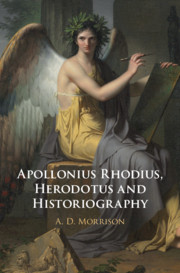Book contents
- Apollonius Rhodius, Herodotus and Historiography
- Apollonius Rhodius, Herodotus and Historiography
- Copyright page
- Dedication
- Contents
- Preface
- Abbreviations
- Introduction
- Chapter 1 Receiving Herodotus
- Chapter 2 Creating Authorities
- Chapter 3 Explaining the Past
- Chapter 4 Telling Stories
- Chapter 5 Greeks and Non-Greeks
- Chapter 6 Kings and Leaders
- Conclusions and Consequences
- Select Bibliography
- Index of Subjects
- Index of Passages
Chapter 4 - Telling Stories
Published online by Cambridge University Press: 13 January 2020
- Apollonius Rhodius, Herodotus and Historiography
- Apollonius Rhodius, Herodotus and Historiography
- Copyright page
- Dedication
- Contents
- Preface
- Abbreviations
- Introduction
- Chapter 1 Receiving Herodotus
- Chapter 2 Creating Authorities
- Chapter 3 Explaining the Past
- Chapter 4 Telling Stories
- Chapter 5 Greeks and Non-Greeks
- Chapter 6 Kings and Leaders
- Conclusions and Consequences
- Select Bibliography
- Index of Subjects
- Index of Passages
Summary
We have so far examined both how Apollonius exploits general features of the historiographical mode shared by a number of historians and more particularly how he adapts various aspects of Herodotus’ historiographical manner and method; it is also important to focus attention on the various narratives themselves within the Histories and how they are engaged with by the Argonautica. There are several important examples of specific logoi, narratives or locations in Herodotus forming significant reference points for the readers of the epic. These are instances of sections from the text of Herodotus forming a ‘modello-esemplare’ for particular parts of the Argonautica, in which a given section forms the model (or example) on which the Apollonian passage is based.1 Such instances reinforce for the readers of the poem the importance of the broader intertextual relationship between Apollonius’ epic and Herodotus (as both historiographical modello-codice and the modello-esemplare for particular passages), and so lead the readers to expect and look for further examples of interaction with Herodotus (both in terms of specific passages and as a wider reference point as a representative of a type of discourse). Accordingly in this chapter I shall examine particularly important examples of specific interactions with Herodotus and the patterns in the use of these examples which we can discern, especially the importance of Herodotus’ interest in the beginnings of his narrative of Greek/non-Greek conflict) at crucial narrative junctures in Apollonius, and the presence of significant Herodotean places, locations and episodes in the Argonautica. As in the , the implications of the use of Herodotus in this way for reading the Argonautica as containing possible exemplars for Ptolemaic rulers or institutions will be explored.
- Type
- Chapter
- Information
- Apollonius Rhodius, Herodotus and Historiography , pp. 124 - 144Publisher: Cambridge University PressPrint publication year: 2020

